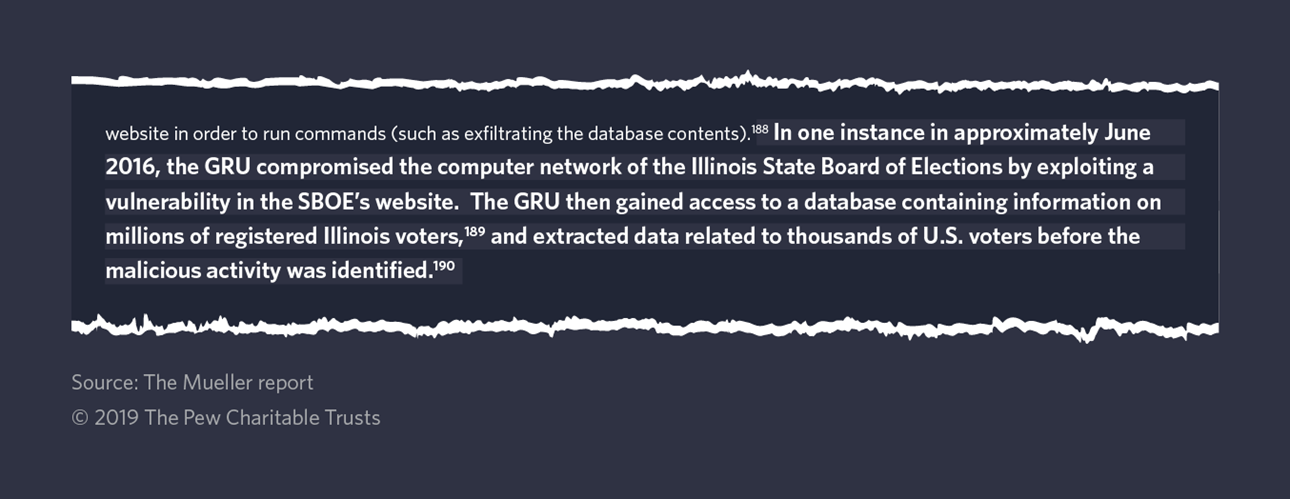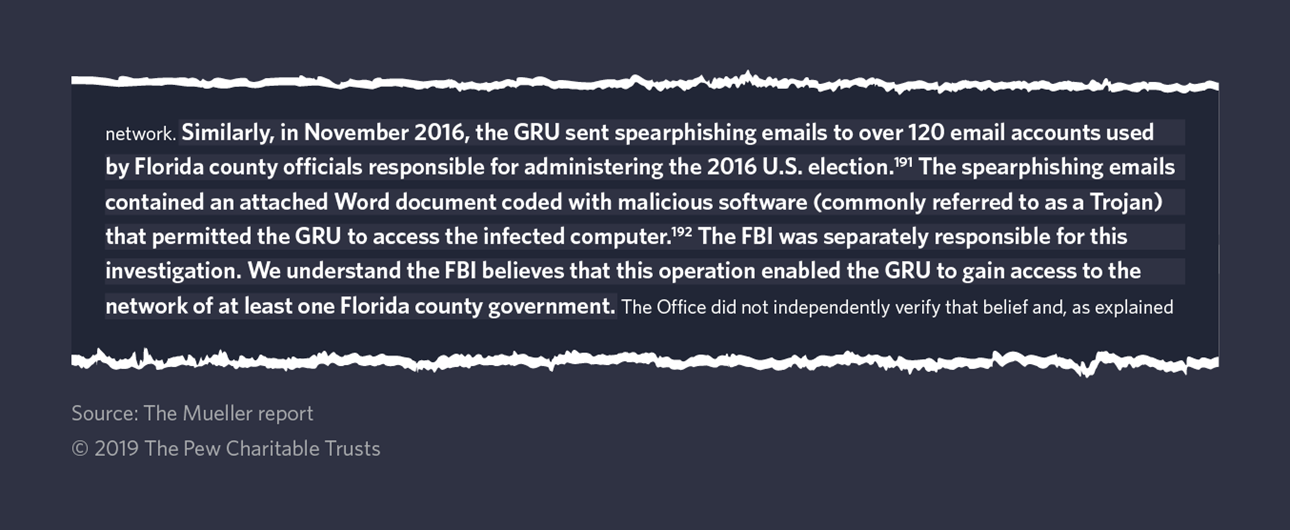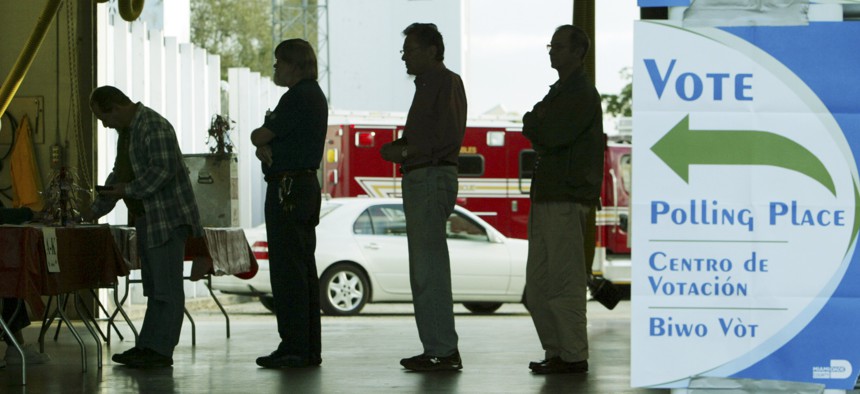Connecting state and local government leaders
Major breaches into state and local election systems worry election officials.
This article was originally published by Stateline, an initiative of The Pew Charitable Trusts.
Tucked into the 448-page report from Special Counsel Robert Mueller were four paragraphs about major breaches into state and local election systems.
Mueller’s description of Russian interference designed to help the Trump campaign was a reminder of how far many state and local officials have come in securing election infrastructure, but also of how stark the threat remains to the nation’s 8,000 election offices.
The report even disclosed a previously unknown breach: Russian intelligence agents in November 2016 tried to introduce corrupted files into election offices in several Florida counties. The hackers succeeded in at least one of those counties, the report indicates.
It raises questions about election systems’ vulnerability to outside hackers — and why the FBI didn’t tell Florida officials about the attempted strike.
Election security experts say malicious foreign actors continue this year to target voter registration databases, Election Day result programs, and election office websites and social media profiles as they did during the last presidential election.
“It once again reinforces that this is a legitimate threat,” said Maurice Turner, a senior technologist at the nonprofit Center for Democracy and Technology in Washington, D.C. “This isn’t just a one-time issue that’s come and gone.”
Any interference operations targeting the 2020 presidential election already have begun, Turner said. Phishing emails designed to allow hackers to capture passwords, usernames or personal information through unwitting officials likely have already gone out, he said.
Top U.S. intelligence officials also are warning that Russia is trying to interfere with and influence U.S. elections once again. At a recent event at the Council on Foreign Relations, FBI Director Christopher Wray said Russia poses a “very significant counterintelligence threat” to the United States.
“We recognize that our adversaries are going to keep adapting and upping their game,” Wray said. “So, we’re very much viewing 2018 as just kind of a dress rehearsal for the big show in 2020.”
The FBI did not respond to a request from Stateline for comment.
Lawrence Norden, deputy director of the democracy program at the New York University Law School School’s Brennan Center for Justice, said in an interview with Stateline that there are still several glaring holes in U.S. election security.
In 12 states, some counties still use paperless voting machines, and in four states every county does, according to a March report from Brennan. Without a paper record, officials cannot guarantee the accuracy of vote tallies, and systems are vulnerable to hacking, Norden said.
“There have been a lot of changes since 2016,” Norden said, “but it’s hard not to feel frustrated that we haven’t done more.”
Six states with some jurisdictions that still use paperless machines — Indiana, Kansas, Kentucky, Mississippi, Tennessee and Texas — indicated to Brennan that they don’t have the money to replace their voting machines, a common problem for election officials. This may leave them at risk of malfunctions, long lines and potential security issues.
Preserving the public’s trust in an election system that Russians hacked remains a challenge for local election officials in Illinois, one of the states with documented breaches.
Tazewell County Clerk John Ackerman, serving 91,000 voters south of Peoria, said interference during the 2016 presidential election stoked fear among residents that their votes might not be tallied accurately.
“While we’re diligent in making sure our system is secure, we also have to instill confidence in the system among the voting public that we’re not asleep at the wheel,” Ackerman said. “Russia wanted us to feel our system is broken. That’s not the case. It’s strong.”
In addition to working closely with the state to monitor the security of its election systems, the county uses an optical-scan voting machine with a paper record to audit results and prevent tampering, Ackerman said.
The Mueller report describes the July 2016 infiltration of the state’s voter registration database. Russian operatives, finding a vulnerability in the Illinois State Board of Elections website, accessed the system and stole information on half-a-million voters.

Two years after the theft, Illinois invested $7 million in a Cyber Navigator Program to assist local election authorities with cybersecurity. Nine “cyber navigators” — experts assigned to different regions throughout the state — train local officials, monitor local systems and respond to hacks.
This partnership might be critical for many of the small rural communities in Illinois that lack the resources and knowledge of best practices to secure their election systems, said Matt Dietrich, a spokesman for the Illinois State Board of Elections.
“We had extra motivation because we had that episode in 2016,” he said, “but the main point of that program is to make sure that none of our 108 local election authorities become the weak link in our election system in Illinois.”
“We got some small counties that we don’t want to be the ones to get picked on.”
Dietrich said voter data in Illinois is now “as secure as it could possibly be.”
Since 2016, Illinois and other states have partnered with federal officials at the Department of Homeland Security and the U.S. Election Assistance Commission to share information and coordinate responses to threats.
Even as the intelligence community continues to warn the public about the Russian election threat, some election security experts have been unsatisfied with what they say is an absence of urgency from the White House.
Norden of the Brennan Center said that while the election security community has made progress since the 2016 attacks, there has been a frustrating lack of leadership from top U.S. officials.
“I’m not saying the federal government has to solve every problem,” Norden said, “but having some clear direction from the top, including money, should be a no-brainer.”
There has been some money. Of the $380 million that Congress appropriated last year for improvements in state and local election equipment, 58% of those funds went to cybersecurity, said Christy McCormick, chairwoman of the Election Assistance Commission.
But as the hacking breach in Florida showed, communication between federal authorities and county officials could improve, she said. “We do have some rough spots. Communication has been an issue since the beginning.”
In Florida, neither top politicians nor the public knew about the breaches revealed last month in the Mueller report, in which the Russian military intelligence agency GRU sent a phishing email to 120 election officials throughout the state.
The email, which was disguised as a message from an election equipment vendor, had a coded attachment that could give Russian agents access to election systems, the Mueller report revealed.
Several of those emails were sent to Broward County, said Steve Vancore, a spokesman for the elections office that serves 1.2 million registered voters in the Fort Lauderdale area.
But the county’s email antivirus system caught it and prevented the compromised attachments from reaching officials’ inboxes, he told Stateline. Officials didn’t realize they had received the phishing emails until after the Mueller report was released.
“They attempted to hack us, and our system worked as it was intended to,” he said.
The phishing attempt may not have worked in Broward County, but it did work in at least one county in the Sunshine State. The Mueller report did not say which county was successfully targeted.
Shortly after the Mueller report became public, the Florida Department of State said it had no knowledge about a successful, county-level hacking attempt in 2016.
When the report was released and the department asked the FBI for specific information about the hack, “they declined to share this information with us.” The FBI hasn’t publicly explained its investigation or why it did not notify Florida officials.

The FBI has since agreed to brief Republican Gov. Ron DeSantis and Republican U.S. Sen. Rick Scott this month, according to DeSantis. The public, he told reporters at a news conference in April, has a right to know that it was targeted by hackers.
This lack of communication could hurt public confidence in elections, dissuading people from voting, said Patricia Brigham, president of the League of Women Voters of Florida, an organization that attempts to get people to the polls through a progressive-leaning voter guide and registration drives.
“I think Florida voters have long been rattled by the way this state handles its elections,” she told Stateline. “We need all the facts to ensure that elections are safe moving forward.”
Florida has long had election problems, and 2018 wasn’t an exception. During the midterms, then-Gov. Rick Scott accused “unethical liberals” without evidence of trying to steal the election in Democratic counties. Scott eventually beat Democratic Sen. Bill Nelson after a recount.
The situation in Florida illustrates the conflict and confusion that results when law enforcement withholds information from state and local election officials, said Turner of the Center for Democracy and Technology.
“Election officials need to come to grips with this reality,” Turner said. “With all the talk about information-sharing, they’re not going to have all the information they need to have.”
Matt Vasilogambros is a staff writer for Stateline.

NEXT STORY: Alabama House Passes Bill to Criminalize Most Abortions



